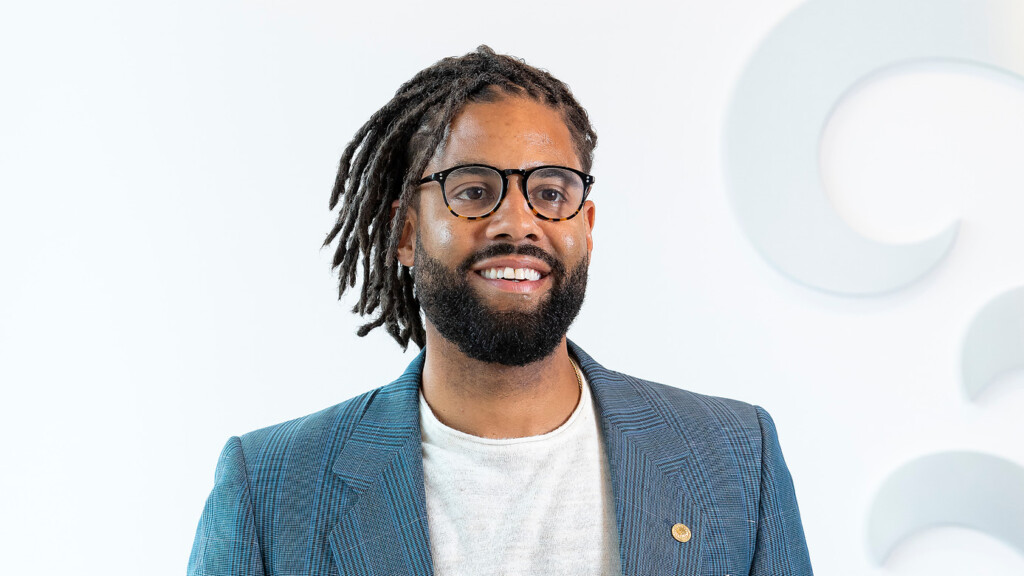Page 315 • (12,798 results in 0.099 seconds)
-

example, that meets the identity and values of a client and we’re winning, I relish the opportunity to be a part of the equation. It gets me fired up.” In the financial industry, education is a constant and evolving cornerstone, Bell explained. Tax law shifts; offerings are always in flux. It keeps him interested and challenged. Bell is an example of someone who didn’t let his majors limit or dictate his career path — he used his education, curiosity and that foundation of academia his mother insisted
-

. “It’s that kind of commitment which marks these graduates,” said Dale Benson ’63, a member of PLU’s Board of Regents who, along with his wife, Jolita ’63, sponsored Jimenez in the Minds Matter program and assisted in the financing of her college education. The Bensons became involved in Minds Matter through a friend at their church. The Bensons were impressed by the program and decided to help out. In a rare downtime slot the week before graduation, Jimenez said that as she walks across the stage on
-
role as active citizens. Course credit is computed by semester hours. The majority of courses are offered for four semester hours. Each undergraduate degree candidate must complete a minimum of 128 semester hours with an overall 2.00 grade point average. Departments or schools may set higher grade point requirements. Degree requirements are specifically stated in this catalog. Students are responsible for becoming familiar with these requirements and meeting them.
-
Are you prior-service? Considering going back to school? Ever thought about becoming an officer?PLU Army ROTC is the educational opportunity of a lifetime, and it may be right for you! To Qualify, You Must: Be a U.S. citizen Be between the ages of 17 and 27 (waiverable for non-scholarship) Have a high school or college GPA of at least 2.50* Have a high school diploma Meet physical standards (ACFT and DoDMERB Medical Physical) Agree to accept a commission and serve in the Army on Active Duty
-
After PLU, and More!South and Harstad communities are reserved for students who are 20 years of age or older (by September 1 for Fall Semester and February 1 for Spring Semester) or who have Junior (60 credits) or higher class standing. These Learning Communities promote a more independent living experience for students who live in the halls, but also support all PLU students as they transition into post-collegiate life. We’ve partnered various campus partners, such as Alumni & Student Connections
-
a natural inhibitor cannot properly function to maintain the balance between osteoclasts and osteoblasts. The patient’s bone health is at a higher risk of getting osteoporosis due to the failure of activating OPG. Steroidal aromatase inhibitor, Exemestane permanently inactivate aromatase, leaving a significant impact on the patient’s body. It decreases the number of breast cancer at a faster rate than the non-steroidal aromatase inhibitors. 4:15 pm - None Scheduled Senior Capstone Seminar None
-

Two PLU students spend the summer reading the stars Physic professors Katrina Hay and Sean O’Neill and students Julian Kop ’24 and Jessica Ordaz ’24 observe and characterize variable stars and globular clusters at PLU’s W. M. Keck Observatory. Posted by: mhines / August 28, 2023 Image: As part of their summer research at PLU, physics professors Sean O’Neill and Katrina Hay, and student researchers Julian Kop (pictured) and Jessica Ordaz utilize the specialized telescope at the W. M. Keck
-
collected many colorful stories as souvenirs along the way. Bergman, professor of English at Pacific Lutheran University, has gone undercover to bust illegal wildlife smugglers. He’s released parrots into the wild. And, as many students who traveled with him know, he’s talked to penguins. In this video, adapted for a past conference on resources and strategies in Lutheran higher education, Bergman discusses his firsthand experiences learning about the beloved birds in the arctic and other animals around
-
child prevented him from envisioning a future in which higher education was valuable or even possible. Instead, the hardships he endured were his instruction. “I was first educated in the adult world,” Cushman said, adding that domestic violence, drug abuse and gang violence were his teachers. “These experiences taught me that unless I worked as hard as I could to get out of where I was, I would only repeat what was being shown to me.” (Video by PLU) Determined to break the cycle, Cushman thus
-
produced by University of Texas Health School of Nursing The relevance of the role of healthcare providers in the events in Nazi Germany to today’s healthcare providers will be discussed. The journey of a school of nursing in making a film about nurses in Nazi Germany as well as of the use of the film in nursing education is explored. Commentator and Presenter: Cathy L. Rozmus, Ph.D., R.N. Vice Dean UTH Professor Francis Nicosia Moderator: Robert P. Ericksen, Mayer Chair of Holocaust Studies, Emeritus
Do you have any feedback for us? If so, feel free to use our Feedback Form.


